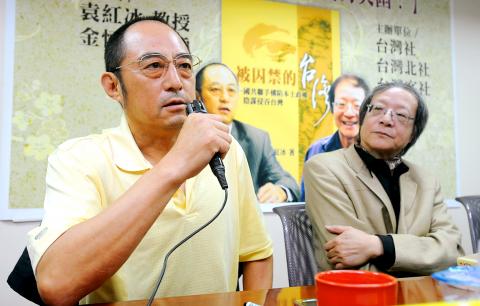|
Writer urges Taiwan
to shun China embrace
ON GUARD: Chinese dissident Yuan Hongbing said
that if local political parties do not stand up to China, a Tibet-style ¡¥peace
accord¡¦ would await the nation
By Chen Ching-min and Jake Chung / Staff reporter, with staff
writer

Political commentator Chin
Heng-wei, right, listens as Chinese dissident and writer Yuan Hongbing addresses
a symposium in Taipei yesterday.
Photo: Lin Cheng-kung, Taipei Times
The transformation of the Chinese
Nationalist Party (KMT) into a political entity more akin to the Chinese
Communist Party (CCP) and the turning of the Democratic Progressive party (DPP)
into a force which favored KMT ideals is the key policy being pursued by China
in relation to its strategy to bring Taiwan into its fold, Chinese dissident
writer Yuan Hongbing (°K¬õ¦B) said in Taipei yesterday.
Yuan made the remarks at a symposium hosted by the Taiwan Society, the Northern
Taiwan Society and the Taiwan Hakka Society titled ¡§Imprisoned Taiwan and Ways
to Break Out.¡¨
Commenting on the recent trip to China made by former DPP premier Frank Hsieh
(Áªø§Ê), Yuan said that despite Hsieh¡¦s comments that ¡§there is no hatred between
the DPP and the CCP,¡¨ the CCP aims to ensure that Taiwan is relegated to
becoming a special municipality, like that of Hong Kong. Such an act would
damage Taiwan and therefore the CCP is Taiwan¡¦s enemy, he said, adding that
Hsieh¡¦s effort to be the ¡§political third wheel¡¨ in the KMT-CCP political
marriage is political suicide.
The Chinese stance on this issue is very clear, Yuan said, pointing to former
Chinese premier Zhu Rongji¡¦s (¦¶Âè°ò) comment that ¡§Nothing good would come of
those who play at pro-Taiwanese independence politics¡¨ as evidence.
The Taiwanese people should not bow to Chinese intimidation or they risk the
loss of the ideal of having their own nation, Yuan said.
Political commentator Chin Heng-wei (ª÷ùÚÞm), meanwhile, said: ¡§It¡¦s very sad to
see [Hsieh] unaware that he is subjected to the United Front (²Î¾Ô) rhetoric.¡¨
Hsieh¡¦s visit had failed as he had not been able to see any of the higher-level
Chinese officials he wanted to meet and he only got to meet various people from
United Front departments, Chin said, adding that the move had not only touched
off an internal argument within the DPP ¡X which the KMT and the CCP could watch
from the sidelines ¡X but it also did not bode well in terms of the DPP¡¦s plan to
return to power.
There are many academics who study China in both Europe and the US who have
never been to China and who rely on reading, the Internet and interaction with
exiled Chinese dissidents, Chin said, adding that these academics were sometimes
more knowledgeable about China than their Chinese counterparts.
¡§There are many ways of understanding China, and you don¡¦t necessarily have to
go there, but if you are about to kowtow to China, then a visit is a must,¡¨ Chin
said.
Commenting on the issue of the cross-strait peace accord previously trumpeted by
President Ma Ying-jeou (°¨^¤E), Yuan said: ¡§You want to know what a [Chinese]
peace accord is? Ask the Tibetans; they know it best.¡¨
Taiwanese people must remember the result of the Agreement of the Central
People¡¦s Government and the Local Government of Tibet on Measures for the
Peaceful Liberation of Tibet signed in 1951 between China and Tibet, he said,
adding that China reneged on the agreement and forcibly oppressed the Tibetan
people.
Yuan Hongbing in words
¡E The writer said that the visit to China by former DPP premier Frank Hsieh was
¡§political suicide¡¨ and that the Chinese Communist Party aims to ensure that
Taiwan becomes nothing more than a special municipality ¡X similar to Hong Kong.
¡E He added that comments by former Chinese premier Zhu Rongji that ¡§nothing good
would come of those who play at pro-Taiwanese independence politics¡¨ indicated
where the country stood on Taiwanese nationhood.
|
![]()
![]()
![]()